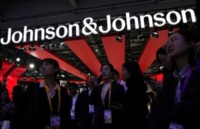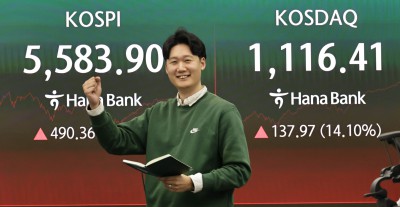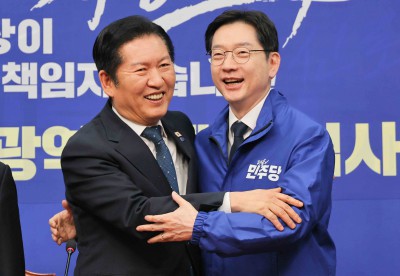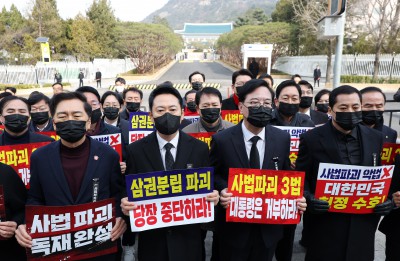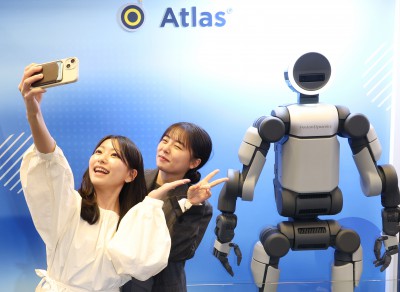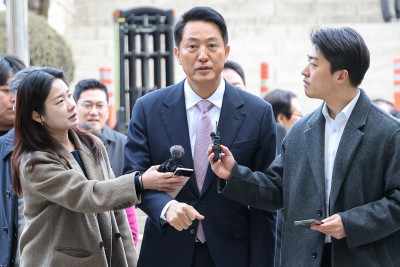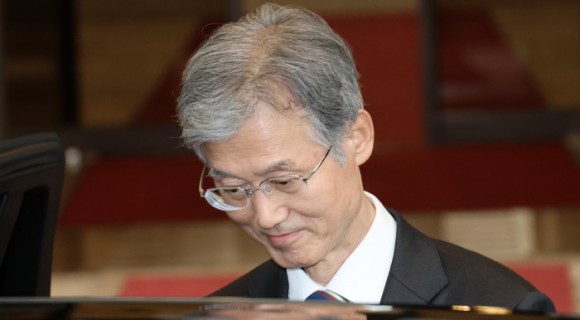Race to the Top is the most meaningful reform of our public schools in a generation. For less than one percent of what we spend on education each year, it has led over 40 states to raise their standards for teaching and learning. These standards were developed, not by Washington, but by Republican and Democratic governors throughout the country. And Race to the Top should be the approach we follow this year as we replace No Child Left Behind with a law that is more flexible and focused on what's best for our kids.
You see, we know what's possible for our children when reform isn't just a top-down mandate, but the work of local teachers and principals; school boards and communities.
Take a school like Bruce Randolph in Denver. Three years ago, it was rated one of the worst schools in Colorado; located on turf between two rival gangs. But last May, 97% of the seniors received their diploma. Most will be the first in their family to go to college. And after the first year of the school's transformation, the principal who made it possible wiped away tears when a student said "Thank you, Mrs. Waters, for showing that we are smart and we can make it."
Let's also remember that after parents, the biggest impact on a child's success comes from the man or woman at the front of the classroom. In South Korea, teachers are known as "nation builders." Here in America, it's time we treated the people who educate our children with the same level of respect. We want to reward good teachers and stop making excuses for bad ones. And over the next ten years, with so many Baby Boomers retiring from our classrooms, we want to prepare 100,000 new teachers in the fields of science, technology, engineering, and math.
In fact, to every young person listening tonight who's contemplating their career choice: If you want to make a difference in the life of our nation; if you want to make a difference in the life of a child - become a teacher. Your country needs you.
Of course, the education race doesn't end with a high school diploma. To compete, higher education must be within reach of every American. That's why we've ended the unwarranted taxpayer subsidies that went to banks, and used the savings to make college affordable for millions of students. And this year, I ask Congress to go further, and make permanent our tuition tax credit - worth $10,000 for four years of college. Because people need to be able to train for new jobs and careers in today's fast-changing economy, we are also revitalizing America's community colleges. Last month, I saw the promise of these schools at Forsyth Tech in North Carolina. Many of the students there used to work in the surrounding factories that have since left town. One mother of two, a woman named Kathy Proctor, had worked in the furniture industry since she was 18 years old. And she told me she's earning her degree in biotechnology now, at 55 years old, not just because the furniture jobs are gone, but because she wants to inspire her children to pursue their dreams too. As Kathy said, "I hope it tells them to never give up."
If we take these steps - if we raise expectations for every child, and give them the best possible chance at an education, from the day they're born until the last job they take - we will reach the goal I set two years ago: by the end of the decade, America will once again have the highest proportion of college graduates in the world.
One last point about education. Today, there are hundreds of thousands of students excelling in our schools who are not American citizens. Some are the children of undocumented workers, who had nothing to do with the actions of their parents. They grew up as Americans and pledge allegiance to our flag, and yet live every day with the threat of deportation. Others come here from abroad to study in our colleges and universities. But as soon as they obtain advanced degrees, we send them back home to compete against us. It makes no sense.
Now, I strongly believe that we should take on, once and for all, the issue of illegal immigration. I am prepared to work with Republicans and Democrats to protect our borders, enforce our laws and address the millions of undocumented workers who are now living in the shadows. I know that debate will be difficult and take time. But tonight, let's agree to make that effort. And let's stop expelling talented, responsible young people who can staff our research labs, start new businesses, and further enrich this nation.
The third step in winning the future is rebuilding America. To attract new businesses to our shores, we need the fastest, most reliable ways to move people, goods, and information - from high-speed rail to high-speed internet.
Our infrastructure used to be the best - but our lead has slipped. South Korean homes now have greater internet access than we do. Countries in Europe and Russia invest more in their roads and railways than we do. China is building faster trains and newer airports. Meanwhile, when our own engineers graded our nation's infrastructure, they gave us a "D."
We have to do better. America is the nation that built the transcontinental railroad, brought electricity to rural communities, and constructed the interstate highway system. The jobs created by these projects didn't just come from laying down tracks or pavement. They came from businesses that opened near a town's new train station or the new off-ramp.
Over the last two years, we have begun rebuilding for the 21st century, a project that has meant thousands of good jobs for the hard-hit construction industry. Tonight, I'm proposing that we redouble these efforts.
We will put more Americans to work repairing crumbling roads and bridges. We will make sure this is fully paid for, attract private investment, and pick projects based on what's best for the economy, not politicians.
Within 25 years, our goal is to give 80% of Americans access to high-speed rail, which could allow you go places in half the time it takes to travel by car. For some trips, it will be faster than flying - without the pat-down. As we speak, routes in California and the Midwest are already underway.
Within the next five years, we will make it possible for business to deploy the next generation of high-speed wireless coverage to 98% of all Americans. This isn't just about a faster internet and fewer dropped calls. It's about connecting every part of America to the digital age. It's about a rural community in Iowa or Alabama where farmers and small business owners will be able to sell their products all over the world. It's about a firefighter who can download the design of a burning building onto a handheld device; a student who can take classes with a digital textbook; or a patient who can have face-to-face video chats with her doctor.
All these investments - in innovation, education, and infrastructure - will make America a better place to do business and create jobs. But to help our companies compete, we also have to knock down barriers that stand in the way of their success.
Over the years, a parade of lobbyists has rigged the tax code to benefit particular companies and industries. Those with accountants or lawyers to work the system can end up paying no taxes at all. But all the rest are hit with one of the highest corporate tax rates in the world. It makes no sense, and it has to change.
So tonight, I'm asking Democrats and Republicans to simplify the system. Get rid of the loopholes. Level the playing field. And use the savings to lower the corporate tax rate for the first time in 25 years - without adding to our deficit.
To help businesses sell more products abroad, we set a goal of doubling our exports by 2014 - because the more we export, the more jobs we create at home. Already, our exports are up. Recently, we signed agreements with India and China that will support more than 250,000 jobs in the United States. And last month, we finalized a trade agreement with South Korea that will support at least 70,000 American jobs. This agreement has unprecedented support from business and labor; Democrats and Republicans, and I ask this Congress to pass it as soon as possible.
Before I took office, I made it clear that we would enforce our trade agreements, and that I would only sign deals that keep faith with American workers, and promote American jobs. That's what we did with Korea, and that's what I intend to do as we pursue agreements with Panama and Colombia, and continue our Asia Pacific and global trade talks.
(계속)







